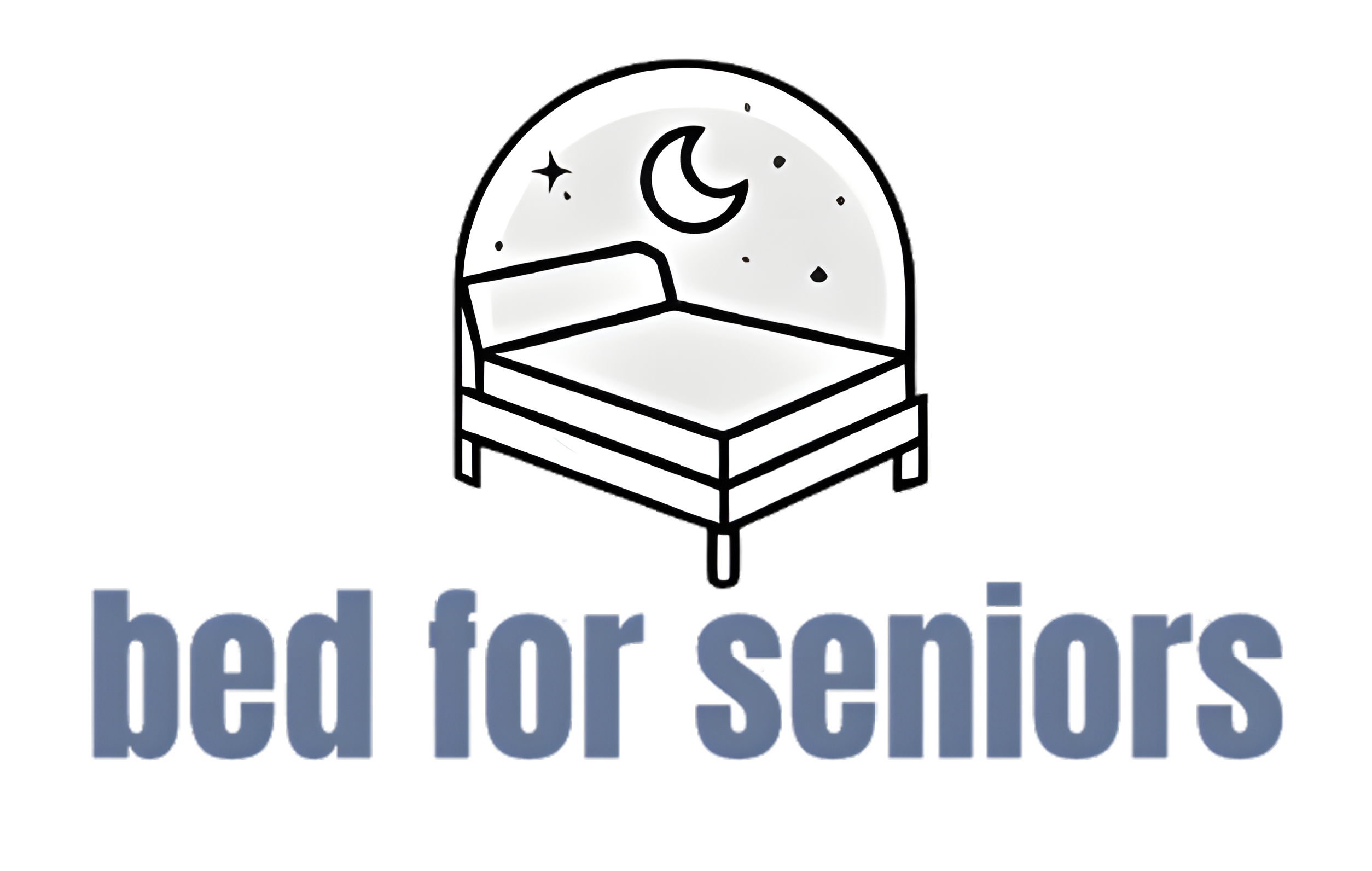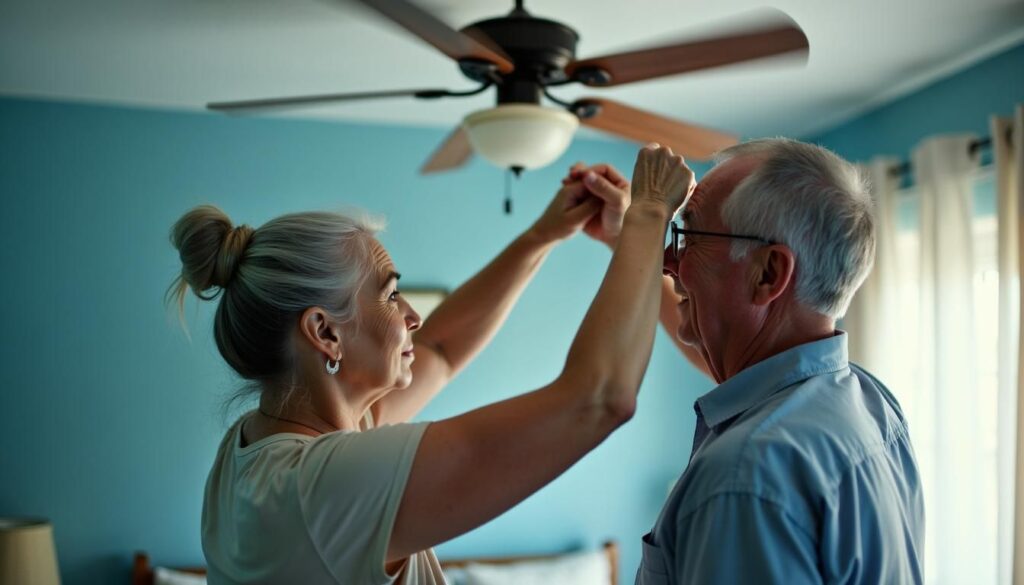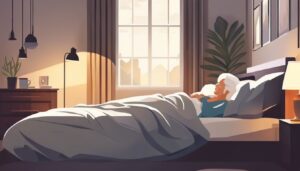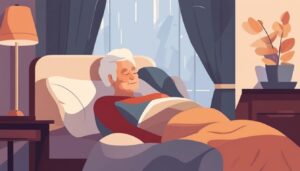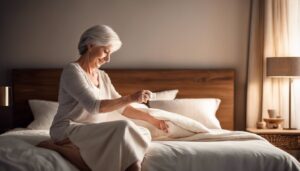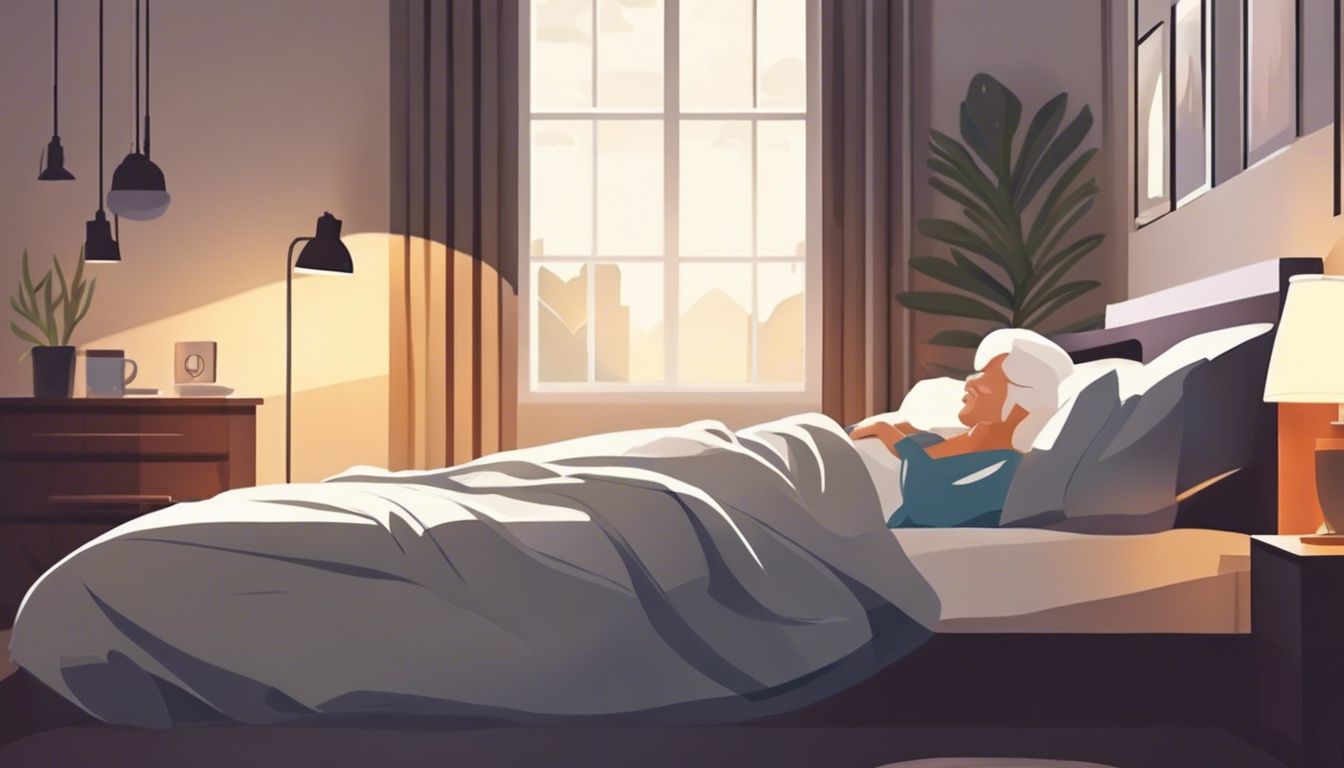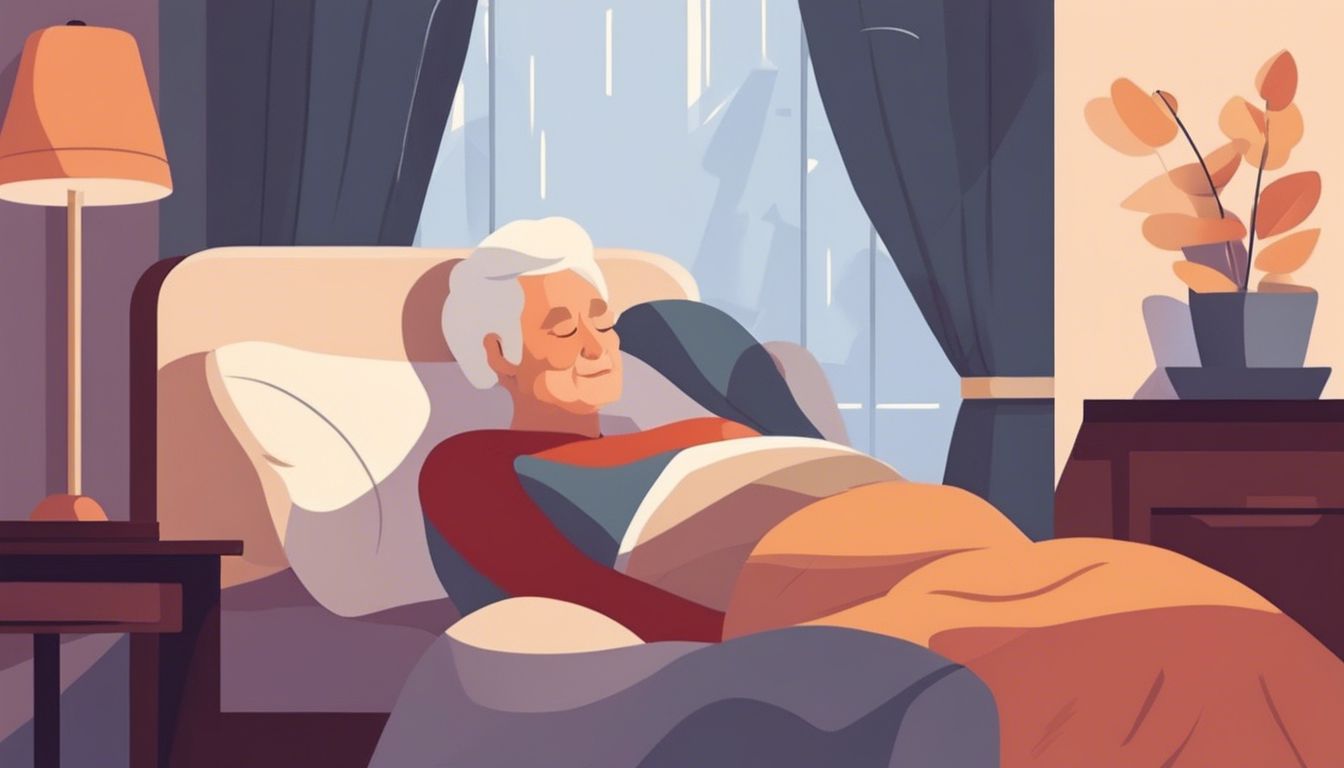Getting good sleep can be tough for seniors. One fact stands out: a cool room boosts sleep quality. This article will show simple changes to make bedrooms better for senior sleep. Start reading….
📋✅
- Keep the room cool between 68 and 77 degrees for better sleep. Use fans or a thermostat to maintain this temperature.
- Cut noise with foam panels, weather stripping, and white noise machines to make it easier to fall asleep.
- Block light using blackout curtains. Control blue light from devices as it can mess with sleep patterns.
- Pick comfy mattresses and bedding that support the body well. Look for ones that help keep you cool too.
- Make sure the air is clean and has good humidity levels, between 30% and 50%. Use air purifiers and humidifiers if needed.
The Relationship Between Sleep Disorders and Cognitive Decline in Older Adults
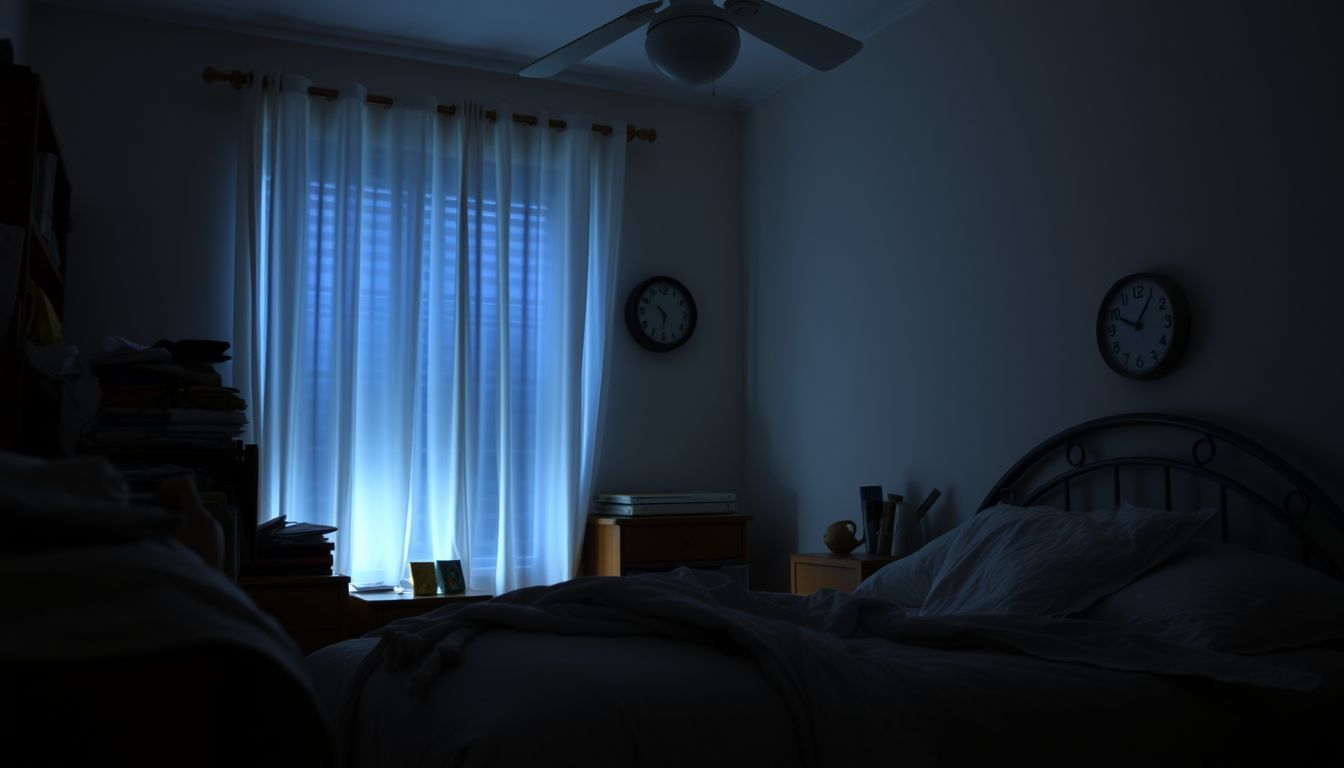
Sleeping issues can contribute to cognitive decline and memory loss in older adults. A significant number of them experience sleep disorders, such as insomnia. This consistent lack of sleep over a period of time can lead to the development of severe conditions including Alzheimer’s disease and dementia.
Adequate sleep is beneficial for brain health as it aids in the elimination of daily accumulated toxins. Poor sleep quality in older individuals results in these toxins persisting in the brain.
For mental resilience, deep sleep stages are crucial for the elderly. This is the period during which the brain undergoes restoration and records new data. In the absence of quality sleep, it becomes challenging for them to retain information or acquire new knowledge.
Therefore, addressing sleep disorders is not only about enhancing nighttime rest but also crucial for maintaining cognitive agility with advancing age.
Optimizing Temperature for Senior Sleep
To get good sleep, seniors need the room at the right coolness. Using a thermostat or fans keeps this steady, helping them nod off faster.
Ideal temperature settings
Setting the right room temperature is key for good sleep, especially for older adults. Experts say the best range is between 68 and 77 degrees Fahrenheit. This helps in keeping their body comfortable through the night.
It also matches their internal biological clock, improving sleep quality.
Next, let’s look at some tools to keep this ideal temperature all night long.
Tools to maintain consistent temperature
Keeping a steady temperature in the bedroom helps seniors sleep better. Here are several ways to do that:
- Use a programmable thermostat: It adjusts the room’s temperature automatically, following a set schedule.
- Install ceiling fans: These keep air moving, making it feel cooler in warm months.
- Get heating blankets: For colder nights, these offer extra warmth without overheating the whole room.
- Try cooling pads for mattresses: These help pull heat away from the body during hot weather.
- Keep windows closed and insulated: This prevents outside temperatures from changing the room’s comfort level.
- Use humidifiers or dehumidifiers: Adjusting humidity can make the temperature feel more comfortable.
- Add layers to bedding: More blankets for cold nights or fewer, lighter sheets for warmer times can help control comfort.
- Dress in appropriate sleepwear: Light fabrics for summer and warmer ones for winter also aid temperature regulation.
Reducing Noise Disturbances
To cut down on noise, consider using insulating materials in the bedroom. White noise devices can also help mask unwanted sounds, making it easier to fall asleep.
Types of soundproofing materials
Sleeping well is key for seniors to stay healthy. Noise can make this hard. Here are ways to cut down on noise:
- Foam Panels: These soak up sound. People put them on walls or ceilings to stop echoes and loud sounds.
- Weather Stripping: This goes around doors and windows. It blocks outside noise from coming in.
- Heavy Drapes: Thick curtains can block out sounds from the street or noisy neighbors.
- Acoustic Tiles: Like foam panels, these attach to walls. They’re good at stopping sound from bouncing around.
- Door Sweeps: Attached to the bottom of a door, they keep noise from slipping through the gap.
- White Noise Machines: These create steady, calming sounds that mask other noises that might wake seniors up.
- Earplugs: A simple but effective way to block out sound while sleeping.
- Rugs and Carpets: Floors can carry sound, but rugs and carpets help by absorbing it.
Using these tools helps seniors sleep better by keeping their rooms quiet and peaceful.
White noise and sound machines
White noise and sound machines make steady sounds. They block out sudden noises that can wake seniors up. Fans, music players, and apps play these sounds too. Use them to help seniors sleep better at night.
Fans, white noise machines, soothing music, or ambient sounds improve sleep.
Managing Light for Better Sleep
To sleep better, controlling light in the bedroom is key. Use thick curtains and special bulbs to block blue light at night.
Blackout curtains and shades
Blackout curtains and shades block light completely. They make the bedroom dark, helping seniors sleep better. Light affects the sleep-wake cycle. Too much light tells the body it’s time to wake up.
With blackout curtains, this doesn’t happen.
These curtains also keep rooms cooler by blocking sunlight heat. This helps maintain an ideal sleeping temperature for seniors. Cooler rooms improve sleep quality and help avoid sleep disturbances caused by overheating.
Benefits of low blue light
After setting up blackout curtains, it’s also key to focus on blue light. Devices like phones and tablets give off blue light. This can mess with sleep by tricking the brain into thinking it’s daytime.
By cutting down on blue light in the evening, seniors can fall asleep easier. Their brains start making melatonin sooner. Melatonin helps us feel sleepy.
Experts agree that less blue light before bed improves sleep quality for seniors.
Reducing blue light exposure at night is crucial for better rest.
Simple steps include using apps that decrease blue light or wearing glasses that block it out. Making these small changes can make a big difference in how well seniors sleep each night.
Comfortable Bedding Choices
Choosing the right mattress and pillows can make a big difference for seniors. Look for options that support the spine and feel good against the skin.
Mattress types suited for seniors
Different mattresses can help seniors sleep better. New mattresses might lessen back pain.
- Memory foam mattresses mold to the body, supporting spine alignment and easing pressure points.
- Latex mattresses offer a firmer support, great for those with back pain. They also keep cool, helping manage core temperature.
- Adjustable beds can change position, lifting the head or feet to reduce acid reflux and improve circulation.
- Innerspring mattresses have coils for support with a softer top. This mix helps with ease of movement during sleep.
- Hybrid mattresses combine foam or latex layers on top of coils, giving both comfort and support. This type is good for those who switch sleeping positions.
- Airbeds let users adjust the firmness on each side of the bed, perfect for couples with different preferences.
- Waterbeds, which use water chambers as support, can be heated to help soothe muscle aches.
Each mattress type offers unique benefits, such as improved spinal alignment from memory foam or better air flow with latex options to keep sleepers cool at night.
Importance of pillow and bedding materials
Selecting the appropriate pillow and bedding is crucial for improved sleep, particularly for the elderly. A pillow with the right firmness and loft can provide good neck support, alleviating pain, and ensuring a restful sleep.
Bedding should also promote air circulation effectively. Sheets with good breathability can help maintain body temperature throughout the night.
The selection of materials is very critical for pillows and bedding. Excellent options include cotton, bamboo, and linen, given their soft and breathable nature. These materials keep moisture away, assisting in maintaining a cool and dry state throughout the night.
Your sleep quality is heavily reliant on the surface your head rests on.
Air Quality and Ventilation
Clean air matters in a bedroom, especially for seniors. Air purifiers remove harmful particles, and keeping the right humidity can prevent dryness.
Use of air purifiers
Air purifiers play a key role in making the bedroom a better place for seniors to sleep. They remove dust and pollutants from the air. This leads to cleaner air that helps seniors relax and sleep better.
Keeping the room free of allergens is important for good sleep hygiene.
These devices also help maintain fresh air in the room, which boosts sleep quality. A regular cleaning routine, including vacuuming, works well with air purifiers to filter out allergens.
Using both can greatly improve indoor air quality. Proper humidity levels are essential too, and humidifiers work well with air purifiers to achieve this balance. Together, they create an environment that promotes healthier sleep spaces by reducing dust mites and other irritants.
Importance of maintaining proper humidity
Cleaning the air is just one step. Next, keeping the right amount of moisture in the room is key. The best humidity level for sleeping well is between 30% and 50%. This range helps seniors breathe easier and sleep better.
Too dry or too damp can cause problems. A hygrometer helps check this level. It costs less than $20.
You can use tools to keep moisture perfect. For air that’s too dry, a humidifier adds moisture. If it’s too wet, a dehumidifier takes water out of the air. Keeping these levels right stops germs from growing and makes breathing easy at night.
This way, seniors feel better when they wake up.
Minimizing Clutter and Enhancing Safety
Clearing space makes moving safe and simple. Add night lights to guide the way….
Organizing for ease of movement
Organizing a room well makes moving around easier for seniors. This reduces the chance of falls and makes it safer to navigate the space.
- Place furniture along the walls – This opens up the center of the room, allowing more space to walk.
- Secure rugs with non-slip pads – These keep rugs in place, preventing trips and slips.
- Use bright night lights – Installing them along pathways helps seniors see clearly at night, avoiding obstacles.
- Keep essential items within easy reach – Put glasses, medications, and phones on a bedside table to avoid unnecessary stretching or bending.
- Install grab bars in critical areas – Next to the bed and in the bathroom provide support while standing up or moving.
- Choose chairs with arms – They offer extra support when sitting down or getting up.
- Remove low-lying obstacles – Books, shoes, and small furniture can be trip hazards; keep floors clear of clutter.
- Label drawers and cabinets clearly – This helps in finding items quickly without having to search through many places.
- Adjust bed height – Make sure the bed is not too high or too low, making it easier to get in and out of bed safely.
- Use lever-style door handles instead of knobs – These are easier for seniors to use, reducing strain on wrists and hands.
Each step ensures safety and comfort, making movement simpler and preventing accidents in the bedroom environment.
Night lights and accessibility
Easing movement at night matters. Night lights help seniors see clearly. Here are ways to boost safety and access:
- Place night lights in hallways, near the bed, and in the bathroom. This helps seniors move safely without turning on bright lights.
- Use motion-sensor lights for automatic illumination. They light up when someone moves near them.
- Install grab bars next to the bed and in the bathroom. They offer support when standing or moving.
- Arrange furniture for wide walkways. Make sure paths are clear of obstacles.
- Set up a bedside switch or remote to control room lights easily without getting up.
- Choose night lights with a soft glow. Bright white or blue light can disturb sleep rhythms.
- Put a phone within easy reach of the bed. In case of trouble, help is just a call away.
- Secure loose rugs and remove clutter from floors to prevent trips and falls.
- Ensure door locks are easy to use from inside, adding security and peace of mind.
These steps create a safer bedroom environment, making it easier for seniors to get around at night without risking falls or confusion.
Conclusion
Optimizing a bedroom for seniors means keeping it cool, quiet, and dark. Set the thermostat around 65 degrees Fahrenheit. Use soundproofing or white noise machines to cut down on noise.
Blackout curtains help block unwanted light. Choose comfy mattresses and pillows suited for older adults. Keep air clean with purifiers and control humidity for better breathing at night.
Less clutter makes moving easier, adding safety with night lights helps too. These steps make sleep better and health stronger for seniors.
FAQs
1. How does the bedroom environment affect senior sleep?
The bedroom environment plays a crucial role in promoting better sleep for seniors. Factors like light, noise, and temperature can impact circadian rhythms and melatonin production, leading to difficulty falling asleep or fragmented sleep.
2. What changes can be made to optimize the bedroom for better senior sleep?
To create a more sleep-friendly environment, consider using warm colors that promote relaxation and limit screen time from electronic devices before bed. Also, addressing medical conditions like sleep apnea or restless leg syndrome can improve overall quality of rest.
3. Can certain activities help seniors fall asleep faster?
Yes! Relaxation techniques such as deep breathing or using essential oils can aid in quicker sleep onset. Physical exertion during the day also promotes deeper stages of REM (Rapid Eye Movement) and slow-wave sleep at night.
4. How does inadequate senior sleep affect physical health?
Sleep deprivation in seniors could lead to several physical health issues including obesity, heart disease, high blood pressure, and fatigue due to excessive daytime tiredness.
5. Does poor quality of senior’s sleep have an effect on mental health?
Absolutely! Inadequate or poor-quality rest often leads to mood swings and cognitive function decline which might exacerbate mental health disorders such as Alzheimer’s disease.
6. Are there professional resources available for improving senior’s sleeping habits?
Definitely! A psychologist specializing in internal medicine may provide helpful advice while organizations like Sleep Foundation offer peer-reviewed journals with up-to-date research about optimizing your sleeping environment.
